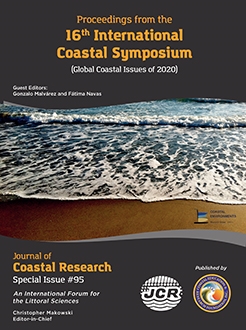Nadal-Caraballo, N.C.; Campbell, M.O.; Gonzalez, V.M.; Torres, M.J.; Melby, J.A., and Taflanidis, A.A., 2020. Coastal Hazards System: A Probabilistic Coastal Hazard Analysis Framework. In: Malvárez, G. and Navas, F. (eds.), Global Coastal Issues of 2020. Journal of Coastal Research, Special Issue No. 95, pp. 1211-1216. Coconut Creek (Florida), ISSN 0749-0208.
Coastal hazards such as storm surge, waves, currents, wind, and rainfall associated with extratropical and tropical cyclones (e.g., hurricanes) can have devastating effects and threaten the lives of millions of people living along the world's coastlines. This has led to the development of the Coastal Hazards System (CHS), an ambitious program with the primary goal of quantifying extreme coastal hazards due to both tropical and extratropical cyclones. The CHS currently covers all U.S. hurricane-prone coastlines along the Gulf of Mexico, the Atlantic seaboard, Puerto Rico, and the U.S. Virgin Islands, as well as regions affected only by extratropical storms like the Great Lakes. The Probabilistic Coastal Hazard Analysis (PCHA) is an innovative statistical and probabilistic framework that serves as the foundation of the CHS. This framework includes comprehensive characterization of storm climatology, high-resolution numerical modeling, and advanced joint probability analysis of atmospheric forcing and primary storm responses, including associated aleatory and epistemic uncertainties. New PCHA advancements overcome limitations of previous joint probability methods by integrating meta-Gaussian copula for the computation of storm probabilities, spatially-varying bias and uncertainty quantification, and Gaussian process metamodel (GPM) based on existing CHS synthetic tropical cyclones. GPM emulates the response of computationally-expensive hydrodynamic models and enables the generation of augmented tropical cyclone suites, consisting of up to millions of storms, for optimal coverage of the parameter and probability spaces. The CHS also includes a database and a web-based data mining and visualization system for public distribution of high-fidelity probabilistic, atmospheric and hydrodynamic modeling results. PCHA results are distributed along with the corresponding metadata, in self-describing data formats for easy and efficient use by engineers, planners, economists, emergency managers, and researchers.





